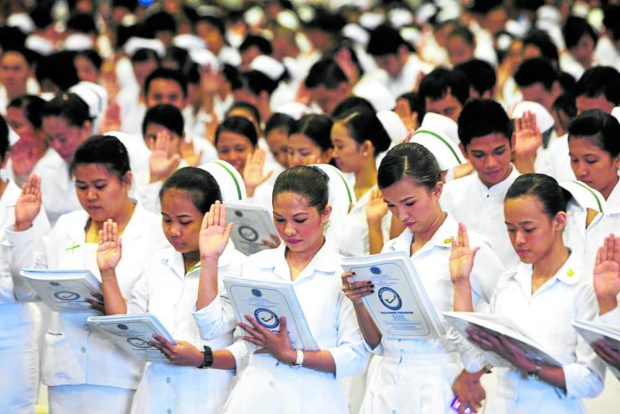
FILE PHOTO: Nurses take their oaths. INQUIRER FILES
President Ferdinand Marcos Jr. again convened his Private Sector Advisory Council at Malacañang on Thursday to discuss ways to address the “brain drain” on the health sector and come up with ways to strengthen it.
The council, which the President formed last month to involve the private sector in governance, is divided into industry groups and includes leaders of various sectors.
During the meeting of the health sector, headed by Paolo Maximo Borromeo of Ayala Healthcare Holdings, Marcos supported proposals to incentivize training for the country’s health professionals.
“I like the ladderized idea for the nurses because that’s really becoming a problem – the brain drain that we are suffering,” a Palace statement on Friday quoted the President as saying.
“They are so good, everybody wants them. And they are willing to pay for it, and we are not, or we’re not able. So we have to come up with some strategies for that,” he said.
READ: Nurses’ exodus: Choice obvious between better future abroad, shabby treatment at home
According to the President, one of the programs that could help keep doctors, nurses, and other medical practitioners from leaving the country is to provide them with scholarships.
Maria Rosario Vergeire, officer in charge of the Department of Health (DOH), who was also present at the meeting, said the ladderized program was already being done at the University (UP) of the Philippines-Manila and in some local governments.
Under the program, UP Manila offers a two-year scholarship for midwives who, upon course completion, come back to the community to serve.
After gaining experience, the midwives go back to UP Manila and study nursing for another two years.
The program effectively cuts the study period for midwifery and nursing in half, without sacrificing knowledge of the required real-world skills.
“So this ladderized program, there is this counterpart with local government. So we now have a couple of local governments that we have piloted this with,” Vergeire said.
During the meeting, the Technical Education and Skills Development Authority (Tesda) was also tapped to help address the exodus of health-care workers in the country.
Borromeo said the Tesda has been offering a six-month nursing aide course and has produced graduates who could be deployed in hospitals after a few months.
“What the hospitals do is they train them further, another 30 days to do IG, to do phlebotomy, or nasal NGT. And it improves the ratio of beds that nurses [are] able to do in hospitals. Quick win like that is easy to do if you can encourage more nursing aides,” Borromeo said.
Data from the DOH showed that there are 617,000 licensed nurses in the country, with 28 percent working in both public and private health facilities, or about 172,000.
The DOH said 316,000 or 51 percent have already migrated, while 21 percent are working in other areas other than healthcare.
Borromeo said that aside from providing scholarships, the government must review the current salaries and benefits of nurses.